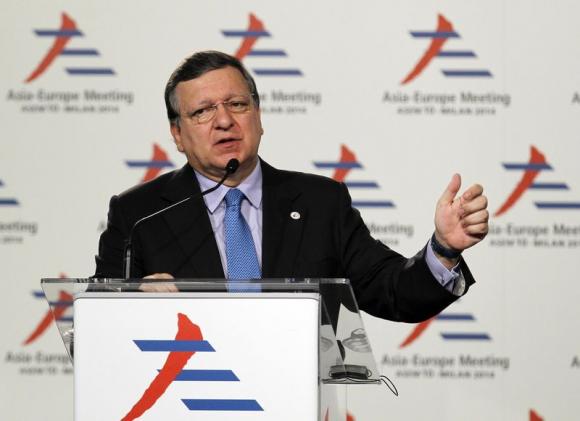(Reuters) – European Commission President Jose Manuel Barroso will on Monday issue a plea to Britain not to isolate itself in Europe by picking fights over immigration, saying that European Union membership boosts British international clout.

Britain’s future in the 28-country trading bloc has been thrown into question by Prime Minister David Cameron, who has adopted an increasingly defiant stance on immigration to tackle the threat of the anti-EU UK Independence Party. UKIP’s rising popularity threatens his bid for re-election in 2015.
Barroso, whose 10-year term as head of the EU’s executive body comes to an end next month, issued a warning to Cameron on Sunday against trying to seek changes to the EU’s freedom of movement rules, saying they were essential to the bloc’s internal market.
In a speech due to be delivered on Monday he will go further, saying that by engaging in such rhetoric on immigration, Britain risks isolating itself in Europe and undermining its attempts to achieve wider reforms.
It would be an historic mistake if on these issues Britain were to continue to alienate its natural allies in central and eastern Europe, Barroso will say in a speech at London’s Chatham House.
It is an illusion to believe that space for dialogue can be created if the tone and substance of the arguments you put forward question the very principle at stake and offend fellow Member States.
Under pressure from UKIP and eurosceptic lawmakers within his own party, Cameron has promised that if he wins the next election he will seek to renegotiate Britain’s European ties and put the new relationship to voters at a referendum by 2017.
Cameron has broadly outlined areas in which he wants to win reform from the EU, such as migration controls, retaining lawmaking powers at a national level, and cutting red-tape for businesses. He has not given specific details however. Other British parties also want reforms, but there is no consensus on a renegotiation strategy.
FRIENDS
Barroso will say that while he understands British voters’ concerns over Europe, the country has benefited from having the backing of other EU states on major geopolitical issues such as climate change negotiations and sanctions against Russia.
In short, could the UK get by without a little help from your friends? My answer is probably not, he will say.
Last week Cameron, who has long said he would like Britain to stay in a reformed EU, struck a newly eurosceptic note, warning that his renegotiation attempt would be his last, and acknowledging that it might end in failure.
Barroso will criticise parties across the British establishment for not being straight with voters about the benefits of EU membership, and for not challenging euroscepticism.
He will urge leaders to start making a positive case for remaining in Europe, or risk losing a potential referendum.
If people read only negative and often false portrayals in their newspapers from Monday to Saturday, you cannot expect them to nail the European flag on their front door on Sunday, he will say.
(Editing by Abigail Fielding-Smith)
